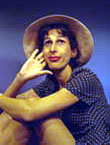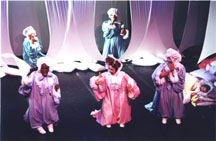
aren Acioly is a Brazilian actress, playwright and director. An artist creator and also the director of the Teatro do Jockey, the Theatre for Children Reference Centre, in Rio de Janeiro, supported by the
city's government.
For 20 years, she has dedicated herself to creating plays for children.  A long road which started in 1984, before the positive image that this kind of theatre was achieved, as it is nowadays. A long road which started in 1984, before the positive image that this kind of theatre was achieved, as it is nowadays.
In her work, Karen shows a deep interest in themes of Brazilian culture and historical characters. The composers Braguinha (Sinfonieta Braguinha), Noel Rosa (Garoto Noel) and Vila Lobos (Tuhu, o
menino Vila Lobos); Santos Dumont (Os Meus Balões); the Bossa Nova, the Brazilian music of the sixties (A Bossinha Nova), the Zé Pereira, a colonial parade in Carnival (Viva o Zé Pereira), among others.
She has been recognized by critics and children since her first play De repente no Recreio, awarded with the Mambembe Prize, one of the
most important prizes in Brazilian theatre. Karen has also written for TV and is a cinema and TV actress, but she says: "I pray for the day when I can only write and direct".
Karen is also a mother of two: a child and a teenager. In the month of the International Women's Day and the International Day of Theatre
for Children, March 20th, we met Karen Acioly, the woman and the artist. Learn more about her, her story, her ideas, her extreme faith in
Art. And also her most recent creation: the National and International Archive of Plays for Children- the Pedro Dominguez Archive.

How did theatre for children come into your life?
At seven years old, when I was a student at Bennet High School which had a beautiful theatre, and a collection of more than 300 costumes.
There, with Lucia Coelho and Magda Modesto, I learned how to love theatre and invent things on stage. After that, I taught Art to children
at the Nucleo de Artes da Urca (NAU). Actually, I was a teenager when I started teaching Art to children. My students and I have an "umbilical" relation even today. Then I took part in some theatre
groups directed by Naum Alves de Souza, Tizuka Yamazaki, Hamilton Vaz Pereira, among others who I love so much; finally came the moment to write and direct my own plays.
What are your most recent productions for children?
"Bagunça, a ópera baby" and "Sinfonieta Braguinha". I have also directed "O samba pras crianças", a project by Zé Renato, "A ópera
do menino maluquinho, which hasn't premiered in Rio yet, and the Bombando, a musical group that sings a cappella.
Which ones do you consider most important to your career?
All of them. I have 23 plays staged and I can say that I love each one passionately. Choosing between them is very hard, I don't have the necessary distance yet.
Maternity have some influence on your work? I mean, did a life with children change your way to write for them?
I usually say that my life is AC / DC, I mean, before Ciro and after Ciro. I was very young when Ciro was born and after that my way of seeing and feeling the world changed completely. That's why my work on
theatre also changed. When Dora was born, twelve years later, everything changed in my life and work again. I still have a close tie
with childhood; that is fundamental when you write or direct plays for children.
How do you create a difference between children and young people audiences? Do you consider that your work is aimed at
children or young people? I am asking that because I see some balance between those audiences in some of your performances.
My works are for both. Obviously, when I stage a play for babies, for example, I know that the sensory perceptions must be strongly
stimulated. But the play must contemplate the sensibility you want to reach before considering an audience's age. Each audience is different, but what they do have in common is emotion, the aesthetic
choice, and sensibility. If your work involves those criteria, you find your audience.
You started your career before some artist's movements that today try to organize and acquire political support for children's theatre. I'd like to know how was to produce, write
and direct a play for children 20 years ago, before all that? What has changed , in terms of production, through the years?
The innocence. There is no more romanticism when creating and producing a play, as it was a long time ago. Today the artist who does
not get involved in bureaucracy is a lost boat in the sea. Before those movements, there were very important ones which prioritized the
artistic creation more than the financial support. That no longer exists. Even the old movements (Motim, for example) were less centerd on themselves and more open.
How were children twenty years ago? Have they changed?
Everything has changed, but not children's perplexity towards the world. That is forever, since we have children, since we have the world...
What is the Pedro Dominguez Archive?
The Archive distributes and circulates plays that were written for children, building up our historical memory, beyond giving incentive to
young playwrights to write for them. The Archive is for teachers, educators, parents, and others interested in this area. It is on the second floor of the Teatro do Jockey, beside the reading room, and it
will be named Pedro Dominguez, one of the most important children's theatre artists who died a year ago. So far, we have 240 plays and 64
playwrights. As we can see, we are going to receive much more; this will be wonderful.
Is it possible for playwrights outside of Brazil to send plays?
Everybody is welcome. The plays should be in their original languages. And if some producer shows interest to stage it, the translation will be approved by the playwright.
What about financial support for the Archive?
We are trying to get money for that, so we can have a web site and online plays creating our cultural memory. We're just beginning.
How can someone do research in the Archive?
One can choose a playwright and read the play. If he/she wants more info on the playwright, the Theatre for Children Reference Centre will
put them in contact. If a producer, for example, is interested to stage a play from the Archive, the Centre of Reference will be able to approach producer and playwright for future business.
And the Teatro do Jockey, when do you start working there?
I started working there two years ago. Since the Teatro do Jockey housed the Children's Theatre Reference Centre, we have increased
our audience by 378%! Through the years, we had more than 185 different plays staged, very finished performances, in several shows. And everything in a modest theatre with 129 seats. It is a wonderful
victory!
What are your future projects for Teatro do Jockey?
Too many projects! But I am going to tell you only one, I wouldn't like to bother the reader: The III Children's Language Interchange (the
name is good because it tells what it really is). Despite the projects, we should consolidate what we are doing today. And this is quite a lot!
KAREN ACIOLY WEB SITE: www.karenacioly.com.br
TEATRO DO JOCKEY / Children's Theatre Reference Centre
Tel: (55-21) 2540-9853
E mail: tjockey@rio.rj.gov.br
|